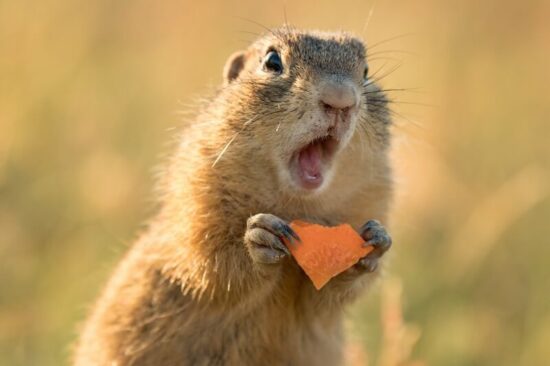While squirrel bites are uncommon, they are a possibility. If you live in an urban area or have food in your backyard, you’ve probably noticed how friendly and bold these critters can become!
This guide will teach you about squirrel bites and treatment options in the rare instance where one occurs.
Table of Contents
Do Squirrels Bite?
Squirrels are adorable little backyard critters that you might see every day. They’re so common that many people forget that squirrels are wild animals. Like other creatures you might encounter, squirrels are unpredictable and fully capable of defending themselves when they need to.
Yes, squirrels do bite. These tree-dwelling rodents have strong teeth that can break through tough acorns without any issues.
Expert Tip: Interestingly, their teeth continue to grow throughout the squirrel’s life! These creatures need to constantly chew on tough items to keep their chompers at a reasonable length.
Those teeth can be sharp, and it doesn’t take much force to break the skin and draw blood. Squirrels aren’t particularly vicious, and they don’t set out to bite humans. But there are certain situations where the squirrel might feel compelled to go on the offensive. Any time the animal feels threatened is fair game.
In most cases, squirrels will simply flee the moment they sense danger. They’re notoriously flighty and will often run to the nearest tree when they sense your presence. However, squirrels might bite when they feel blocked in and incapable of retreating.

Another common biting scenario is when babies are involved. Squirrels are quite protective of their young. Baby squirrels are more trusting than adults, so they can get into sticky situations that leave parents no other choice but to bite humans to keep their young safe.
Finally, squirrels can bite humans by accident! Believe it or not, this is a pretty common situation. Many people try to feed squirrels by hand.
Those who are lucky enough to earn a squirrel’s trust could be on the receiving end of a nasty bite. These critters are short-sighted and often mistake a finger for a piece of food!
What Does A Squirrel Bite Look Like?
What a squirrel bite looks like depends entirely on how vicious it is. Usually, bites look like a couple of red dots on the skin. In some cases, the squirrel may break the skin and cause bleeding.
If the squirrel felt pretty threatened, it might try to cause more harm. These animals can bite you more than once in only a few seconds. They can also pull at the skin, resulting in more severe injuries that require stitches.
Fortunately, those types of bites are on the rare side. Usually, squirrels will bite once before fleeing, leaving behind a small set of bite marks.
Potential Health Concerns If You Get Bitten By A Squirrel
The immediate pain of a squirrel bite is just one thing you have to worry about.
While rare, these backyard animals can carry parasites and diseases that cause more trouble than the bite. Here are just some of the potential health issues you consider after a squirrel bite.
Rabies
Of course, rabies is usually the biggest concern for people. Rabies is a serious disease that almost always kills humans. There are only a handful of reported survivors in all of the disease’s recorded history.
Fortunately, the disease is all but eradicated thanks to pet vaccinations. But wild animals can still carry it!
The good news is that squirrels aren’t known to transmit rabies to humans. It’s a possibility, but the chances of that happening are very rare.
All that said, it’s better to err on the side of caution and pay attention to symptoms. If you suspect that the animal had rabies, seek medical care.
Leptospirosis
Leptospirosis is a bacterial disease that usually occurs when animal urine gets into an open wound. Squirrel bites happen very quickly, and many things can happen during the fray. It’s not unheard of for the animal to urinate on you shortly after taking a bite.
This disease can eventually cause meningitis or kidney failure. That typically follows mild symptoms like headaches, fever, and rashes. Luckily, leptospirosis is relatively easy to treat with antibiotics.
Tularemia
This bacterial disease happens when you make contact with a dead animal. You’re not likely to encounter this issue if the squirrel bites you and flees. But if you retaliate and kill the animal, it’s a possibility.
Tularemia comes with a range of symptoms. It can cause skin ulcers, high body temperature, migraines, and more. Once again, antibiotics can address this disease effectively.
Salmonellosis
Salmonellosis is a well-known disease caused by the salmonella virus. It lives in squirrel feces.
Salmonellosis can wreak havoc on your digestive system. Treatment involves a mix of antibiotics, hydration, and electrolyte replacement.
Lyme Disease
Lyme disease is another common disease that many people fear. Squirrels don’t have to bite you to expose you to it. Even getting near is enough, thanks to the ticks they might carry.
This inflammatory disease can cause many issues if left untreated. These include heart palpitations, face palsy, and more.
Roundworm Brain Parasite
Squirrels can carry roundworm brain parasites. It causes erratic behavior and other symptoms similar to rabies. Thankfully, it’s rare for these animals to transmit the parasites to humans (especially through bites).
If the parasites make it onto your body, they can cause trouble in your organs and brain. The parasites can cause muscle control issues, a loss of coordination, and other life-changing problems.
General Infection
Of course, you can also experience general wound infection from the squirrel bite. Bacteria can enter the wound, causing inflammation, discharge, and more. Don’t avoid treating infected bite wounds!
Infections can get into your bloodstream and cause sepsis.
Squirrel Bite Treatment
Getting bitten by a squirrel can be pretty jarring. No one expects these backyard critters to cause harm, so bites can catch you off guard.
The most important thing to do is remain calm and separate yourself from the squirrel. There’s a good chance that the animal will do that for you by running away! Once you know you’re safe from another bite, you’ll have to treat your wound to avoid further issues.
Here’s the best approach when it comes to squirrel bite treatment.
Clean The Wound
The first step to take with squirrel bite treatment is to clean the area. As mentioned earlier, squirrels can carry diseases that are transmittable to humans. But even if the animal doesn’t pose a significant disease threat, the open wound is susceptible to bacterial invasion.
Cleaning the wound will help you keep infections at bay.
Wash the bite with warm water and some mild soap. If you have it on hand, use antibacterial soap. Lather up and be gentle.
You can use rubbing alcohol or hydrogen peroxide to clean the wound. However, using those products is up to your discretion. Some believe that they’re too harsh for the delicate tissue and can slow down healing.
However, others say that the peace of mind you get from those strong products is worth the potential mild adverse effects.
Apply Antiseptic Ointment
Next, apply antiseptic ointment. There are countless brands out there to use.
The ointment is thick and can cover the open wounds nicely. Most importantly, it’ll provide ongoing protection against bacteria and infection.
Bandage The Bite
Covering the squirrel bite is another way to keep it clean and bacteria-free. How you bandage it depends on how severe the wound is. A standard adhesive bandage will work fine if it’s just a tiny bite.
But more extensive injuries might require gauze wrap. Cover the entire wound and make sure to buy additional bandages. You’ll want to replace it every once in a while as you heal.
Seek Medical Attention If Necessary
Finally, keep an eye on your symptoms and seek medical care if you feel it’s necessary. Look out for symptoms like fever, sweats, muscle aches, and nausea. Those issues can indicate a serious underlying illness.
It’s always good to jot down some information about the biting incident. Make a note of any suspicious behaviors that could indicate that the animal was rabid. If you suspect it had rabies, don’t hesitate to go to the hospital.
Ways To Avoid Squirrel Bites In The Future
The best thing you can do to avoid squirrel bites is admire these animals from a distance. Don’t let their cute appearance fool you. They are still wild animals that can bite and lash out unpredictably.
Avoid trying to feed these critters by hand. Feeders and yard accessories are acceptable. But once again, it’s about admiring from a distance!
Don’t attempt to get close or invade the squirrel’s personal space.
Consider securing sheds or outdoor structures. Squirrels often seek shelter when they’re nesting and about to have babies. Adult squirrels are fiercely protective, and even accidental encounters could make the rodents want to bite you!
Expert Tip: Ultimately, the best way to prevent future squirrel bites is to limit close contact with the animals. You can live harmoniously with squirrels in your backyard. But the moment you try to get too close is when you put yourself at risk.
Steps To Take If Your Pet Gets Bitten By A Squirrel
It’s not just humans that squirrels can bite. They can also nip at your cat or dog.
Cats and dogs have notoriously high prey drives. Some species have stronger inclinations than others, but most are keen on chasing small critters. Squirrels are the perfect target, and most pets want nothing more than to catch these tree rodents!
Most squirrels are fast enough to get away from a chasing canine or feline. However, it is possible for them to get caught.
When that happens, don’t be surprised if your pet experiences a painful bite! All the same disease risks exist with your pet. That includes rabies.
Hopefully, your cat and dog are already vaccinated for rabies. But there are no immunizations for other diseases. If your pet gets bitten, it’s best to seek veterinary care to be on the safe side.
Before doing that, wash around the wound like you would if it were on you. Cleaning will help prevent infection as you make your way to a vet.
Your vet can provide any necessary medications and guide how to care for the wound moving forward.
Do Baby Squirrels Bite?
Technically speaking, baby squirrels can bite. However, bites from a baby are even less common than bites from an adult.
The young squirrels are more trusting of humans than their adult counterparts. It’s not uncommon for babies to run right up to humans and climb up their legs! It’s an adorable experience, but it’s also one you should avoid.
When babies interact with humans, the parents often go into defense mode. Mothers are prone to biting when they’re trying to protect their babies.
Avoid interacting with baby squirrels at all costs. Otherwise, you risk getting on the mother’s bad side!
Conclusion
Squirrels do bite, but they don’t want to! These little animals prefer to scamper away than fight, so there’s probably a reason if one feels the need to do so.
As long as you respect these animals and don’t attempt to feed them, the chance of a bite is very small. But now you’ll be prepared in case it happens!


